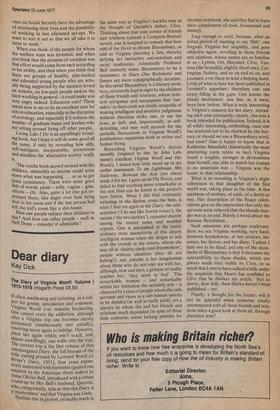Dear diary
Kay Dick
The Diary of Virginia Woolf: Volume I 1915-1919 (Hogarth Press £8.50) If often maddening and irritating, as a subject for gossip, speculation and comment, Virginia Woolf ever remains fascinating. One cannot resist the addiction, although after a Virginia trip one becomes sternly puritanical (intellectually and socially), resolving never again to indulge. However, Place her again within one's reach, and, almost unwillingly, one walks into the trap. The current trip is the first volume of that unexpurgated Diary, the full blooms of the little cutting pruned by Leonard Woolf (A Writer's Diary, 1951), four years expansively annotated with footnotes (geared one suspects to the American thesis rodeo) by Anne Olivier Bell, introduced with a robust round-up by Mrs Bell's husband, Quentin, Who, categorically, tells us that this Diary is a 'masterpiece and that Virginia was a lady.
Hackles rise in protest, probably much in
the same way as Virginia's hackles rose at the thought of Quentin's father, Clive. Thinking about that cosy corner of friends and relations (almost a Compton-Burnett novel), one is tempted to remark that how odd of the Devil to choose Bloomsbury, as odd as Virginia choosing a Jew, thereby defying her instinctive anti-semitism and racist tendencies. Admittedly Professor Bell correctly states Bloomsbury to be a misnomer; in Diary One Richmond and Sussex are more topographically accurate. In this serial Bloomsbury is a literary snobbery, reverently kept in sight by the children of those friends and relations, whose insistent arrogance and assumption that 'outsiders' to their circle are totally incapable of making intelligent and sensitive judgments without direction strike one, to say the least, as daft, and, impersonally, as selfdefeating, and may well account for the periodic fluctuations in Virginia Woolfs posthumous reputation both as writer and human being. Rereading Virginia Woolf's fiction recently (inspired to this by John Lehmann's excellent Virginia Woolf and Her World), I found how little stood up to my earlier assessment. To the Lighthouse, Mrs Dalloway, Between the Acts just about made it for me. I gave up on The Waves, and failed to find anything more remarkable in the rest than can be found in the period's best fiction. What I did -find constantly irritating in the fiction, even the best, is what I find yet again in the Diary; the antisemitism CI do not like Jewish voices'), the racism ('the two darkies'), repeated chattily among the nature notes and weather reports. One is astonished at the extraordinary crass insensitivity of this clearly intelligent woman when she deigns to 'mix with the crowds in the streets, whom she sees all as 'shabby clerks and dressmakers', people without identities (they do not belong!); sad, pitiable is her imagination about those who do not take tea with her, although, now and then, a glimpse of reality reaches her, 'they seem to feel'. This remarkable woman — and remarkable within her limitation she certainly was — is obsessed by a class of people whom she calls servants and views as a sub-human species to be derided (as well as badly paid), yet a species on whom she and her friends and relations much depended (in spite of those little outbursts about lacking pennies for
another notebook, she and they had to have their complement of cook, housemaid and nanny).
Easy enough to cavil, because, after an initial period of wanting to say 'Shit', one forgives Virginia her stupidity, and goes addictive again, revelling in those friends and relations, whose names are so familiar
to us — Lytton, Ott, Maynard, Clive, Vanessa (the beautiful, slightly aloof one), Carrington, Sydney, and so on and so on, and _Leonard, ever there to lend a helping hand. Little of what is here has been published in Leonard's appetiser; therefore one can enjoy filling in the gaps. One knows the places mentioned; one has, as it were, been here before. What is truly interesting is Virginia's concern for her diary, rereading each year constantly; clearly, this was a book intended for publication. Indeed, it is all wildly interesting, enthralling, once one has resolved not to be shocked by the horrors, or should we use a Bloomsbury word, bad taste? One% is happy to know that in Katherine Mansfield (historically the most interesting parts relate to her) Virginia found a toughie, stronger in deviousness than herself, one able to match her trumps in no uncertain way — Virginia was the looser in that relationship.
What is so revealing is Virginia's slight references to that slaughter of the first world war, taking place at the time. A few mentions of airships, of raids, of a death or two. Her description of the Peace celebrations give us the impression that only the servants were relieved that the bloody murder was at an end. Barely a word about the Russian Revolution.
Such omissions are perhaps irrelevant. Here we see Virginia working, very hard, between breakdowns, at her reviews, her essays, her fiction, and her diary. 'I admit I hate not to be liked; and one of the drawbacks of Bloomsbury is that it increases my susceptibility to these shades, which are ,always made very visible by Clive, in so much that I own to have sulked a little under the suspicion that Murry has confided to Clive that he dislikes my article.' Not to worry, dear lady, their diaries haven't been published — yet.
Finally, a thought for the future: will it not be splendid when someone totally unconnected with all those friends and relations takes a good look at them all, through precision lens?














































 Previous page
Previous page